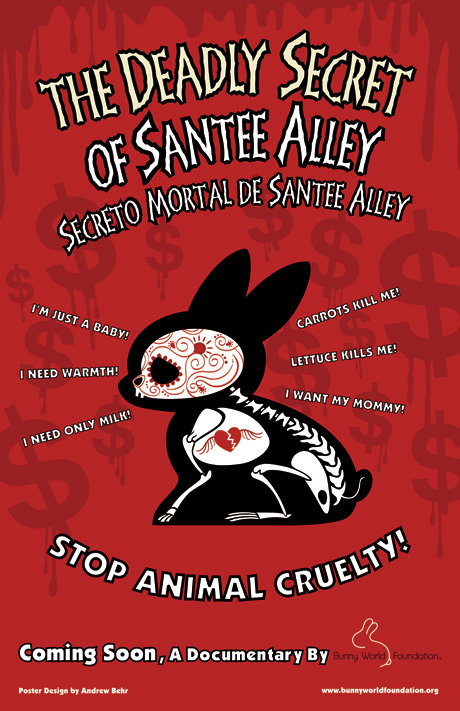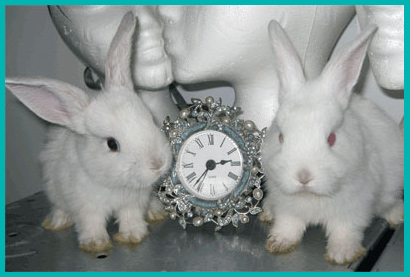Outdoor Dangers for Rabbits
by Rabbit Rescue, Inc.
The rabbits in the pet population today are not the same rabbits we remember happily living free in the backyard when we were kids. Those were leftovers from the meat and fur industry, a simple breed - sturdy and usually pretty healthy.
Since becoming more popular as a show animal and household pet, today's rabbit is more delicate and less capable of enduring physically stressful conditions. Overbreeding for meaningless things like fur color patterns or body size and shape has bred in genetic frailties over the years. Having to cope with the stresses of outdoor existence now takes years off a rabbit's lifespan. It is a fact that a healthy spayed or neutered indoor rabbit can live 10 to 15 years. (My oldest is 13 years old and still feisty as ever). Also a fact - outdoor rabbits usually live only three to five years.
If you have an outside rabbit that has lived longer than that - YOU HAVE BEEN LUCKY - .nothing more, nothing less. People constantly tell me "But my yard is safe. It's all enclosed." Unless you live inside a biodome, NO YARD IS COMPLETELY SAFE. If they were, I wouldn't hear of so many sad endings.
I get calls and emails all the time from people who have lost their rabbits in tragically preventable accidents. They are listed below and are all too common. These dangers apply to all outdoor rabbits, whether running loose, in a hutch/enclosure, or on an open patio - and all come from personal accounts told directly to me. I want these horrible deaths and injuries to end. If you know someone who has their bun outside PLEASE pass this on to them. If your bun is outside bring him in NOW. Before he makes the list.
- Dog attacks. Either the rabbit burrows out of the yard, someone leaves the gate open, or a dog jumps the fence. Even if the dog doesn't fatally injure your rabbit it can literally scare him to death.
- Nocturnal predators. Creatures you'll never see because they come out while you're sleeping. Again, a predator doesn't even have to make physical contact with your rabbit to harm or kill him. Merely the PERCEIVED threat of a predator can scare your rabbit into a heart attack or cause him to break his back while panicking. Raccoons, cats, coyotes; the predators vary by location, but ALL locations have some. Hutches are no protection against the FEAR of death.
- Malicious mischief. I've been told horrible stories of human cruelty that would break your heart. I will never understand how a human being can victimize the most helpless among us, but they do.
- Hawk attack. Don't tell me you don't have hawks. Unless you live underground, you have hawks. Yes, even in the city. And no, your dog will not keep them away. Bushes or burrows are not adequate protection. Raptors are fast and fearless when on the hunt. Recent fires have forced many predators to alter their normal feeding habits and come into cities for food.
- Ingesting raccoon feces. Rabbits like it for some reason, and it hosts an intestinal parasite fatal to rabbits. Raccoon waste looks similar to cat waste. Raccoons are a fact of city life. They travel by the sewer system and everyone's got 'em.
- Illness due to bacterias in soil. They don't even have to be diggers to catch these, just walking on contaminated dirt will do it.
- Illness due to a weak immune system, compromised by the stresses of existing outside. Also illnesses that go unnoticed until it's too late, because you can't properly monitor food intake, elimination habits, or the general health of a rabbit that doesn't live with you.
- Poisoning. Domestic rabbits do not know to avoid poisonous foliage like their wild counterparts. Also pesticides sprayed nearby can poison your rabbit, as can fumes from nearby fumigation. Antifreeze is a common killer of free-roaming animals of all species.
- Domestic or feral cat attack. Cats have extremely potent viral "poisons" in their saliva that are toxic to rabbits or any small animal. One puncture wound or scratch can overwhelm a rabbit with infection and eventually kill him if left untreated.
- Suffering or death from extreme heat or cold. Rabbits can suffer brain damage or death in high temps, or suffer hypothermia from low temps. Extreme heat and cold also aggravate arthritis, a painful condition common in hutch-bound or outdoor rabbits.
- Death or severe injury from jumping off a balcony. Rabbits are made for jumping and all animals are unpredictable. It happens all the time.
- Gates left open, allowing your rabbit to run off. No matter how careful you are personally, anyone can fail to fully latch a gate or forget and leave it open. You, a child, a meter reader, roommate, neighbor etc. It only takes a moment for bun to get away.
- Burrowing out of the yard. Rabbits are famous burrowers and can dig under a fence very quickly.
- Ingestion of dry cat or dog food resulting in severe illness (requiring hospitalization), or death. The kibble bits expand in the stomach as they absorb moisture, causing a shutdown of stomach functions. The stomach can also burst.
- Ingestion of birdseed. Rabbits are lagomorphs, not rodents, and can't digest nut or seed mixes like rodents can. It can cause blockages that require immediate medical care to resolve. Whether it's fallen from an outdoor bird feeder or an indoor bird cage, it's dangerous.
- Flystrike. Rabbit waste, like most animal waste, is attractive to flys. If the rabbit gets any waste stuck to the fur around his rear end (and it doesn't take much) flies will land and plant their eggs in the skin of the rabbit. When the eggs hatch the maggots actually eat the flesh of the rabbit. This will cause the rabbit to go into shock and die a painful death unless it is addressed immediately. The best chance at survival the rabbit has is to get him to a vet experienced with rabbits right away. Without veterinary care, the rabbit will die.
The first three sentences of this page should be enough reason to keep your rabbit indoors....but I'll add the fact that rabbits are intelligent, social animals; they may be silent, but they're not dumb. Condemning them to a life of solitude and danger is just plain cruel. People tell me "But my bunny is happy outside." A human child would be happy living in an amusement park...that doesn't mean it's what's safest or healthiest for them. Your rabbit will exist wherever he has to and his safety is your responsibility. If you love your rabbit, and if there's even the slightest chance any of these misfortunes could befall him - why on earth would you risk it?
Be responsible, be humane, and give your rabbit a chance to live a long, safe, happy life as a real member of your family. You won't be sorry you did. And your rabbit won't end up sorry you didn't!








